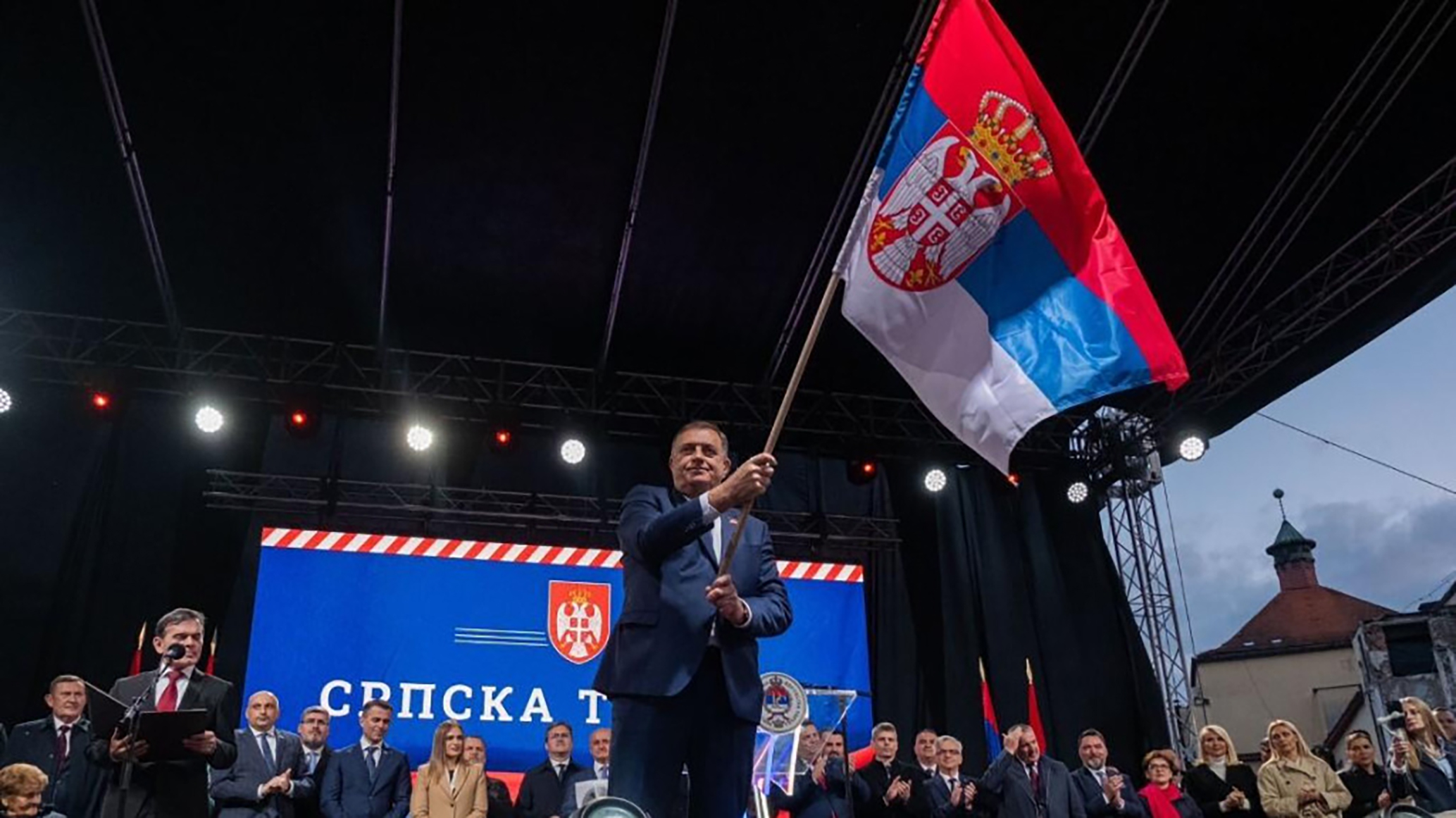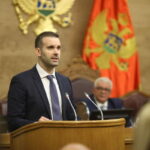The resolution of the UN General Assembly on the genocide in Srebrenica was only supposed to fixate a fact long proven by international courts. But the Serbs perceived it practically as an attack on the Serbian people and Republika Srpska.
Vucic set up in New York a separate team which he thought would help him undermine the scheduled vote.
Dodik exploited the fact of the Resolution preparation to declare his entity’s intention to secede from Republika Srpska.
In response, Bosnians rallied to defend their state.
The atmosphere resembles that of the early 1990s, journalists note.
Complications
The May 2 UN General Assembly session, at which the resolution on Srebrenica was supposed to be voted on was postponed. Belgrade officials believe this is the result of the active efforts by Serbian leadership. President Aleksandar Vučič and his team launched in recent days an intense international campaign aimed at opposing killing the Resolution at its inception.
In Belgrade, Vucic’s team engaged with embassies, after which some diplomats issued public statements in support of the Serbian position that the massacre of Bosnian Muslims in Srebrenica was a crime, but in no way genocide. Among them were the ambassadors of Iran and Israel.
In New York, Vucic created an actual headquarters to oppose the Resolution and held large-scale meetings with dozens of diplomats from Asia, Africa, and Latin America. He also spoke with UN Secretary General António Guterres.
Summarizing this campaign on the diplomatic front, the president of Serbia said: “We managed to create some complications.”
According to Serbian media, the Vučić team’s effort resulted in a declining number of countries that express readiness to support the Resolution, and an increasing number of those set to abstain.
The “complications” that the Serbian leader refers to would be impossible without other formats of pressure on the international community besides diplomacy.
One of them was the accusation of genocide of Serbs during World War 2. Vučić promised that, should the UNGA pass the resolution on the genocide in Srebrenica, he would annually table appropriate resolutions stating that “Croats committed genocide in Jasenovac” and “Germans committed it in Kragujevac”. This idea was actively picked up by the Russians, who accused Germany of the genocide of the Soviet/Russian people.
In general, Belgrade and Moscow are totally synchronized on the Srebrenica genocide resolution, as proven by Vučić’s meeting in New York with Russia’s Permanent Representative to the UN, Vasily Nebenzya.
However, the key factor that has complicated the adoption of the Resolution was the rapid deterioration of the security situation in Bosnia and Herzegovina against the background of preparations for the UNGA session.
For the first time in years, observers stated that the situation “resembles that of the early 1990s”, and the word “war” now often flashes in BiH news headlines.
“Srpska is calling you”
It should be recalled that the draft resolution proposes to annually mark July 11 as the “International Day of Remembrance of the Genocide committed in Srebrenica in 1995”, to condemn the denial of genocide, as well as the heroization of war criminals, and to include the facts of the crime established by court in school curricula of the UN member states to prevent revisionism and the repetition of genocide.
However, political leaders of the Serbs considered the draft resolution as a threat to the existence of Republika Srpska, and RS authorities immediately announced their intention to secede from Bosnia and Herzegovina. Milorad Dodik actually issued an ultimatum, stating: “If the Resolution on Srebrenica is adopted by the UN General Assembly, Republika Srpska sees no point in remaining part of Bosnia and Herzegovina.” “We will explore and adjust our status in such a way that we can try to move forward on our own,” he said after a meeting of the Serbian state leadership and Republika Srpska leaders in mid-April.
A few days later, during a “Srpska te zove” (“Srpska is calling you”) rally in Banja Luka, Dodik called on Muslims to withdraw the Srebrenica Resolution if they were willing to live alongside Serbs in Bosnia and Herzegovina. “If not, we will not mention this again. … Next step will be movement towards unity with Serbia,” he said.
On May 2, when the Resolution on Genocide was to be considered at the UN General Assembly, the RS government scheduled a meeting in Srebrenica. And although Dodik stressed that the RS leadership is ready to pay respect to the victims buried in Potočary, the idea of holding a government meeting at the site of a horrific crime was perceived as a threatening message to local Bosniaks. After consideration of the Resolution at the UN was postponed, Dodik also postponed the government meeting but stopped short of calling it off.
Dodik’s visit to Russia added even more tension. Late April, the RS president, along with the Minister of Security of Bosnia and Herzegovina, Nenad Nešić, and RS Senator and former director of the Serbian Intelligence Service, Aleksandar Vulin, arrived in St. Petersburg for the “International Meeting of High Representatives on Security Issues.” On the sidelines of the forum, Dodik met with the Secretary of the Russian Security Council, Nikolai Patrushev. According to official reports, no fateful decisions were made but the very fact of these talks between the RS president and curator of the Russian security forces, a close Putin ally, is a clear demonstration of Kremlin’s support for Dodik and his policies (including secession plans).
“Homeland is calling you”
The latest activity by the RS president was perceived by Bosnians unequivocally as a threat to the territorial integrity of Bosnia and Herzegovina.
“Dodik’s move to secession” is a “declaration of war,” Bosnia and Herzegovina’s Defense Minister Zukan Helez said in an interview with Bosnian television, commenting on Dodik’s meeting with Patrushev in St. Petersburg. “I know what to do if there is a problem. I have to protect the borders of Bosnia and Herzegovina, which is stipulated in our Defense Law,” the head of the defense ministry emphasized. However, he also reassured citizens, stressing that compared to early 1990s, Bosnia and Herzegovina already has its own powerful government agencies capable of protecting the country, the EUFOR mission, and NATO presence. In addition, the minister recalled that Dodik has been talking about secession for the past 20 years, but in reality words never led to any action.
The ongoing crisis is really not the first such aggravation in BiH over the past few years. But for the first time in a long history, the statements and actions of Serbian leaders intensified Bosnian resistance.
On April 27, hundreds of people from all over Bosnia and Herzegovina gathered in Smetovo near Zenica for the rally “Domovina te zove” (“Homeland is calling you”), organized by Ramo Isak, leader of Snage naroda (“Power of the People”) and Minister of the Interior of the BiH Federation.
“I persistently tell people to sleep peacefully, that there will be no war. But if someone dares to go for this, I took up a rifle as a kid, so it will not be a problem for me to defend our borders, which we will not allow anyone to erase,” Isak said at the rally.
“I know that all of you who took the time to come here showed great strength, the power of the people led by true patriots. We can act only together, first of all through the institutions of the BiH state, and then as volunteers, in order to keep this state, we will not give it up, and no one can threaten it. We don’t know how to surrender,” Isak said.
According to reports, the rally was attended by ex-commander of the Army of the BiH Republic at the times of war, first chief of the General Staff, General Sefer Halilovic, who declared: “There will be no war and there should not be one, but let those who are openly talking about it be aware that we are ready.”
Both Ramo Isak and Sefer Halilovic are quite controversial figures in Bosnian politics, and at present this resistance movement cannot be referred to as one that enjoys pan-Bosnian support. But, obviously, public demand for a more radical than usual reaction to the plans of the leaders of Republika Srpska regarding secession, that is, the collapse of Bosnia and Herzegovina, has increased and become more evident.
Mobilization and destabilization
The radicalization of Bosnian attitudes is taking place against the background of hybrid special operations organized by forces whose origin remains unclear. Their purpose is to mobilize and arm Bosniaks and bring them to the streets.
Late April, an appeal printed on the letterhead of the Parliament of the Federation of Bosnia and Herzegovina emerged across social media and Telegram channels. It purportedly called for BiH citizens to join their country’s defense and warned of a border shutdown for draft-age men (16-63 years of age).
In addition, citizens of Bosnia and Herzegovina received a message via Facebook, allegedly from the “Civil Defense”, claiming men aged 18 to 48 were required to report to police stations for mobilization and get their weapons.
Authorities called all of that a fake spin (these scans really looked nothing like official documents, really) but, judging by the fact that people took these appeals seriously and began to turn to officials with questions about what to do next, the hoax campaign did find some fertile ground.
Also, according to media reports, BiH is currently investigating a case of radical Islamists allegedly being trained at the BiH Armed Forces facility near Mostar, so the situation in the country appears even more threatening.
Under these conditions, it cannot be ruled out that the postponement of Srebrenica genocide resolution vote is due not so much to the successful “offensive” by Vučić on the diplomatic front but to the threat of destabilization in Bosnia and Herzegovina, which seems to have caused serious international concern.
It is unlikely that a large-scale armed conflict will develop in BiH – the EU military mission, EUFOR, has increased its presence in Bosnia and Herzegovina in recent weeks for the purpose of conducting exercises, pulling up reserves, and not only in terms of manpower but also equipment. But in recent weeks, the country has noticeably moved in the direction opposite to sustainable peace.



